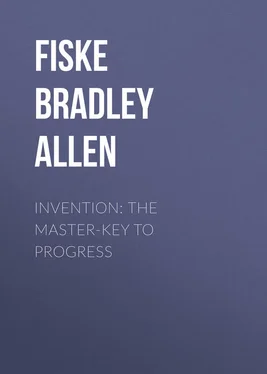Bradley Fiske - Invention - The Master-key to Progress
Здесь есть возможность читать онлайн «Bradley Fiske - Invention - The Master-key to Progress» — ознакомительный отрывок электронной книги совершенно бесплатно, а после прочтения отрывка купить полную версию. В некоторых случаях можно слушать аудио, скачать через торрент в формате fb2 и присутствует краткое содержание. Жанр: foreign_antique, foreign_prose, на английском языке. Описание произведения, (предисловие) а так же отзывы посетителей доступны на портале библиотеки ЛибКат.
- Название:Invention: The Master-key to Progress
- Автор:
- Жанр:
- Год:неизвестен
- ISBN:нет данных
- Рейтинг книги:4 / 5. Голосов: 1
-
Избранное:Добавить в избранное
- Отзывы:
-
Ваша оценка:
- 80
- 1
- 2
- 3
- 4
- 5
Invention: The Master-key to Progress: краткое содержание, описание и аннотация
Предлагаем к чтению аннотацию, описание, краткое содержание или предисловие (зависит от того, что написал сам автор книги «Invention: The Master-key to Progress»). Если вы не нашли необходимую информацию о книге — напишите в комментариях, мы постараемся отыскать её.
Invention: The Master-key to Progress — читать онлайн ознакомительный отрывок
Ниже представлен текст книги, разбитый по страницам. Система сохранения места последней прочитанной страницы, позволяет с удобством читать онлайн бесплатно книгу «Invention: The Master-key to Progress», без необходимости каждый раз заново искать на чём Вы остановились. Поставьте закладку, и сможете в любой момент перейти на страницу, на которой закончили чтение.
Интервал:
Закладка:
The first act of the originator of the science of astronomy being one of the imagination in conceiving a picture of a celestial machine, and being like that of the inventor in conceiving a picture of an earthly machine; and his second act being also like that of the inventor in developing the picture, a justification for speaking of the "invention" of the science of astronomy may perhaps be reasonably claimed.
(We must bear in mind, of course, that no invention is complete until the third act has been performed, and the thing invented has been actually produced.)
To speak of invention in connection with bringing forth novel creations is far from new, for the phrases "construct a theory," "invent a science," "invent a religion," etc., are in almost daily use; and it may seem unnecessary to some persons, therefore, to discuss it at such length. But most people seem to regard such phrases as merely figurative; while the author wishes to make it plain that they are not figurative but exact.
As this modest treatise does not pretend to be a learned one, and as the author is not a professional scholar, no further attempt will be made to claim the production of the science of astronomy as an invention. To pursue the subject further would be merely to enter a discussion as to the meaning, both original and derived, of the word invention. The author, however, cannot escape the conclusion that, no matter what may be the literally correct meaning of the word, the mental acts performed by the originators of the science of astronomy were like the mental acts performed by the inventors of mechanical appliances, and exerted a similar influence on history. That is, he believes that the men who brought into being the science of astronomy and the men who brought into being the bow and arrow, first saw pictures on the mental retina of some things actual yet vague and formless, and then constructed entities from them. He believes also that the creation of the bow and arrow, and the creation of the science of astronomy constituted actual and similar stepping-stones on which the race rose toward a higher civilization.
In default of any definition of the word invention, which precludes its application to the origination of a science, theory, religion or formulated school of thought, the author begs permission so to use it, in indicating the influence on history of the novel creations which, according to this meaning of the word, have been inventions.
The influence on history of the invention of the science of astronomy has been so great that we cannot estimate its greatness. On it the whole science of navigation rests. Without it, the science and the art of navigation could not exist, no ships could cross the ocean from one port to another, except by accident, and the lands that are separated by the ocean would still rest in complete ignorance of each other. This world would not be a world, but only a widely separated number of barbarian countries; most of them as ignorant of even the existence of the others as in the days before Columbus.
Following the invention of astronomy, or as it was first called, Astrology, the imaginative and practically constructive intellects of the Babylonians naturally led them to invent the sun-dial for indicating the time during the day, and the water-clock for indicating it during the night.
Another invention, doubtless brought into being by the study of the movements of the heavenly bodies, was the duodecimal system of notation, of which the base was twelve. In accordance with this system, the Babylonians divided the Zodiac into twelve equal parts or "signs"; divided the year into nearly equal months, that corresponded approximately to the length of a lunar month; divided a day and a night into twelve equal parts or hours; divided an hour in sixty (12 x 5) equal parts or minutes, and divided a minute into sixty (12 x 5) equal parts or seconds.
The duodecimal system of notation has been supplanted for many purposes by the more convenient decimal system, the invention of which is attributed by some to the Arabs; but the duodecimal divisions of time are still with us, and the duodecimal divisions of the circle are still used in most countries.
The duodecimal system of notation seems to have been the earliest system of notation invented; and it was an invention so important that we cannot imagine civilization without it and the decimal system, possibly its offspring. The influence of these two inventions on history has been so great that the mind is incapable of realizing its greatness, even approximately.
Who were the inventors, we do not know. It is almost certain that none of our generation ever will know, and it is far from probable that any one of any generation will ever know. If any knowledge on this subject is ever given to the world, it will be knowledge of names only – only names. Yet some human beings, forgotten now and probably obscure even in their lifetimes, invented those systems, and contributed more to the real progress of the race than many of the great statesmen and warriors of history.
The Babylonians invented measures of length, capacity and weight, also; and it is from those measures that all the later measures have been directly or indirectly derived. To have invented systems by which time, angle, distance, space, weight and volume were lifted out of the realm of the vague and formless into the realm of the definite and actual, was an achievement that almost suggests that noted in the first chapter of Genesis, in the words, "And God said 'Let there be light,' and there was light"; for what a clearing up of mental darkness followed, when the science of measurement turned its rays on the mysteries that beset the path of early man!
The Egyptians seem to have been inventors, though hardly to the same degree as were the Babylonians. The Egyptians studied the heavens and employed a science of astronomy; and it is possible that they, rather than the Babylonians, should be credited with its invention. But it is not the intention of this book to decide points in dispute in history, or even to discuss them. Its intention is merely to study the influence that inventions and inventors had. Whether the name of an inventor was John Smith or Archimedes, whether he lived in the year 1000 or 1100, or which one of two rival claimants should be credited with the honor of any invention, is often an interesting question; but it is not one that is especially important to us, unless it casts light on the main suggestion of our inquiry. The only reason for mentioning names and dates and countries in this book is to show the sequence of inventions as correctly as practicable. In order to show the influence of invention on history it seems best to give the treatment of the subject an historical character.
Possibly the most important invention of the Egyptians was papyrus, which was the precursor of the paper of today. The clay tablets of the Babylonians were clearly much less adapted to the making of many records than was papyrus. One cannot readily imagine an edition of 300,000 newspapers like the New York Times , made out of clay tablets an inch in thickness, and sold on the streets by newsboys. Clearly the invention of papyrus was one so important that we cannot declare any invention as more important, except on the basis that (other factors being equal) the earlier an invention was the more important it was. To assume such a basis would, of course, be eminently reasonable; because the earlier invention must have supplied the basis in part for the making of the later. The invention of writing, for instance, was more important than the invention of papyrus.
A curious invention of the Egyptians was the art of embalming the bodies of the dead, an art still practiced in civilized countries. It was prompted by their belief that the preservation of the body was necessary, in order to secure the welfare of the soul in the future life. This belief resulted further in building sepulchres of elaborate design, filling them with multitudes of objects of many kinds, decorating the walls with paintings, sculptures and inscriptions, and placing important manuscripts in the coffins with the mummies or embalmed bodies. The sepulchres of the kings were, of course, the largest and most elaborate of all; and of these sepulchres the grandest were the pyramids. By reason of the great care and labor lavished on tombs and sepulchres and pyramids, and by reason also of the dryness of the air in Egypt, and the consequent durability of works of stone, it has been from the tombs that many of the clearest items of information have come to us about old Egyptian times.
Читать дальшеИнтервал:
Закладка:
Похожие книги на «Invention: The Master-key to Progress»
Представляем Вашему вниманию похожие книги на «Invention: The Master-key to Progress» списком для выбора. Мы отобрали схожую по названию и смыслу литературу в надежде предоставить читателям больше вариантов отыскать новые, интересные, ещё непрочитанные произведения.
Обсуждение, отзывы о книге «Invention: The Master-key to Progress» и просто собственные мнения читателей. Оставьте ваши комментарии, напишите, что Вы думаете о произведении, его смысле или главных героях. Укажите что конкретно понравилось, а что нет, и почему Вы так считаете.












